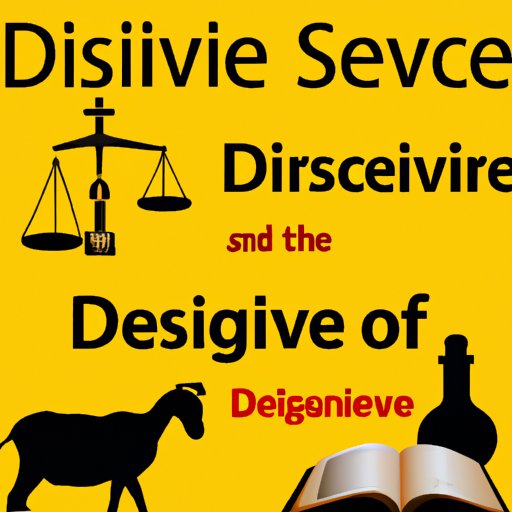Introduction
The Bible is an ancient collection of religious texts that serves as the basis for many branches of Christianity and Judaism. It contains stories and teachings that are believed to be divinely inspired by God. Over the centuries, it has been used to guide believers in their faith. However, in recent years, science has advanced at a rapid rate, providing evidence that contradicts many of the stories found in the bible. This article will explore how scientific findings have disproved the bible and examine the implications of these discoveries on religious beliefs.

Analyzing the Scientific Evidence that Contradicts Biblical Stories
In recent years, scientific advancements have provided evidence that contradicts many of the stories found in the bible. For instance, modern science has proven that the Earth is not only billions of years old, but that it also formed through a process of natural evolution rather than divine creation. Additionally, scientific research has shown that humans did not emerge from two distinct individuals, as is described in the bible, but rather evolved over millions of years from a common ancestor with other primates.
It is important to note that the interpretation of the bible is highly subjective and can vary greatly between different denominations and sects of Christianity. While some may accept the scientific evidence that contradicts certain biblical stories, others may choose to interpret the bible in a way that allows them to maintain their faith. As such, it is difficult to definitively say whether or not science has disproved the bible.

Investigating the Historical Accuracy of Biblical Events in Light of Scientific Discoveries
In addition to contradicting certain stories found in the bible, scientific discoveries have also cast doubt on the historical accuracy of certain events described in the bible. For instance, archaeological evidence has revealed that the city of Jericho, which is mentioned several times in the bible, was not destroyed by Joshua’s army as described in the book of Joshua, but rather fell to invading forces more than 500 years before the time of Joshua.
Similarly, scientific research has revealed that the Great Flood described in the bible never actually occurred. According to geological evidence, there is no evidence of a global flood that would have been necessary to create the Noah’s ark story. Furthermore, genetic studies have revealed that the human population could not have come from just two individuals, as is described in the bible.
These scientific findings have led many to question the historical accuracy of the bible and its stories. In particular, they have raised doubts about the notion of divine creation, as many of the events described in the bible cannot be explained by science. This has prompted many people to reexamine their religious beliefs and consider how scientific discoveries may challenge traditional understandings of religious texts.

Comparing and Contrasting Scientific and Theological Explanations for Phenomena
In addition to questioning the historical accuracy of biblical events, scientific advancements have also provided alternative explanations for phenomena that were once attributed to divine intervention. For example, while the bible describes the sun standing still in the sky during the battle of Gibeon, scientists now attribute this phenomenon to an optical illusion created by the Earth’s rotation.
Similarly, while the bible attributes diseases to demonic possession, medical science now provides explanations for most illnesses based on physical causes. This has led many to question the validity of the theological explanations offered in the bible, as scientific theories provide a more plausible explanation for many phenomena. This has caused many to reconsider their religious beliefs and embrace a more scientific approach to understanding the world.
Exploring the Implications of Scientific Advancements on Religious Beliefs
The implications of scientific advancements on religious beliefs are far-reaching. As scientific findings continue to contradict certain aspects of the bible, many people are beginning to reevaluate their religious beliefs and consider how scientific discoveries may challenge traditional understandings of religious texts. In particular, many people are beginning to embrace a more scientific approach to understanding the world, as it provides a more plausible explanation for many phenomena.
Furthermore, scientific discoveries have also led to greater acceptance of religious diversity, as people are beginning to realize that there is no one “right” answer when it comes to religious belief. As such, people are becoming more tolerant of different religious beliefs and practices, as they recognize that everyone has the right to believe what they choose.
Conclusion
In conclusion, science has provided evidence that contradicts many of the stories found in the bible. By examining the historical accuracy of biblical events in light of scientific discoveries, this article has shed light on the implications of scientific findings on religious beliefs. From challenging traditional notions of divine creation to prompting greater acceptance of religious diversity, scientific advancements have had a profound impact on religious beliefs. It is clear that science has played a significant role in disproving the bible and reshaping religious beliefs in the modern world.
(Note: Is this article not meeting your expectations? Do you have knowledge or insights to share? Unlock new opportunities and expand your reach by joining our authors team. Click Registration to join us and share your expertise with our readers.)
